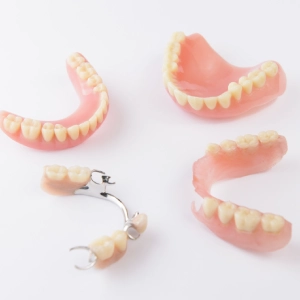
Patient Info
Dental Implants
Cosmetic Dentistry
General Dentistry
Few things in the world of dental health are as transformative as dentures. They offer a practical solution for restoring both function and confidence in one's smile, whether due to age, injury, or other dental concerns. However, despite their relief, questions linger: Can you eat with dentures? How does it impact your dietary choices and enjoyment of food?
For many people, eating with dentures might seem tricky at first. It means getting used to a new way of chewing and tasting food. But learning to eat with dentures can also open up new possibilities for enjoying meals, even if you need to make some changes.
In this blog, we'll talk about what it's like to eat with dentures. We'll cover the challenges and share helpful tips to make eating easier. Let's explore the question: Can you eat with dentures? You might be surprised by the answer.
Dentures are artificial devices designed to replace lost teeth and their surrounding tissues in the mouth. They serve as a removable solution for individuals who have lost all or some of their natural teeth due to various reasons such as age, dental disease, injury, or other oral health issues. Dentures are custom-made to fit a person's mouth's unique shape and contours and are typically made up of acrylic resin, porcelain, or a combination of materials. They are designed to restore chewing function, improve speech, and enhance the smile's appearance.
Dentures are available in various types, such as full dentures that replace all teeth in the upper or lower jaw and partial dentures used when some natural teeth are still present. It's crucial to care for and maintain dentures properly to preserve their longevity and promote oral health. Taking proper care of dentures is crucial to ensure they last long and promote oral health.
Eating with dentures can pose several challenges, including:
Following are some tips for eating with new dentures:
Start by eating soft foods that are easy to chew, like mashed potatoes, yogurt, or scrambled eggs. As you feel more comfortable, slowly add firmer foods back into your diet.
Cut food into smaller, bite-sized pieces to make chewing easier. This reduces the strain on your dentures and makes it more manageable to chew.
Distribute the pressure evenly on both sides of your mouth while chewing to help keep your dentures stable and prevent them from shifting.
Avoid sticky candies, tough meats, and hard nuts, as they can be hard to chew and may loosen your dentures.
Alternate chewing on both sides of your mouth to prevent uneven wear on your dentures and maintain their stability.
Remove your dentures after meals and clean them thoroughly with a denture brush and mild cleanser. Keeping your dentures clean helps prevent irritation and maintains oral hygiene.
Denture adhesives can provide extra stability and help prevent slipping or movement while eating. However, consult your dentist before using them to ensure proper application.
Drink plenty of water during meals to rinse off food particles and keep your mouth moist, which can reduce discomfort from wearing dentures.
Regularly visit your dentist for adjustments and check-ups to ensure that your dentures fit well and feel comfortable.
Following these tips can make the transition to eating with new dentures smoother and more enjoyable.
Transitioning back to your regular diet after getting dentures requires patience and attention. Here are some tips to help make the process smoother:
The question "Can you eat with dentures?" is one that many individuals face as they navigate their dental health journey. While the transition to eating with dentures may present initial challenges, with patience, adaptation, and the right guidance, individuals can enjoy a fulfilling and varied diet.
By understanding the challenges, implementing adaptive strategies, and maintaining good oral hygiene, eating with dentures becomes a manageable and enjoyable experience.
Ready to Eat with Confidence? Schedule Your Appointment at Springhill Dental Health Center, Mobile, AL, Today! For new patients, dial (251) 265-7808. Existing patients can call (251) 343-1521 to secure a consultation.
While dentures allow for a wide range of foods to be enjoyed, it's best to avoid sticky, hard, or tough-to-chew foods that may dislodge or damage dentures.
The adjustment period varies for each individual, but it generally takes several weeks to comfortably adapt to eating with dentures.
Denture adhesives can provide additional stability while eating, but it's essential to consult your dentist for guidance on proper usage and application.
My visit was incredible. I had my “All on Four” appliances cleaned, and it was a painless and thorough experience. Dr. Scott and all his staff are very friendly. During the cleaning, Mary was gentle and let me know everything she was doing and how it would feel. She gave me tips on how to clean my implants/appliances better and gave me a small brush to do the underside more effectively. Dr. Scott and Mary suggest cleanings take place every 3 months so I will be back in December.

Dr. Byron Scott is a highly-trained and accomplished dentist. He attended The University of Alabama School of Dentistry and subsequently completed numerous Advanced Studies and Trainings. Dr. Scott is Board-Certified by The Academy of General Dentistry and has earned Mastership status (MAGD), an honor shared by only 1% of dentists. He has numerous memberships and associations, including Diplomate status with The American Board of Oral Implantology (D-ABOI) and The International Congress of Oral Implantologists (D-ICOI). Overall, Dr. Scott has dedicated his life and career to helping patients improve their oral health through expert dentistry. His goal is to help each patient keep their smile healthy, attractive, and comfortable for the duration of their lifetime.
